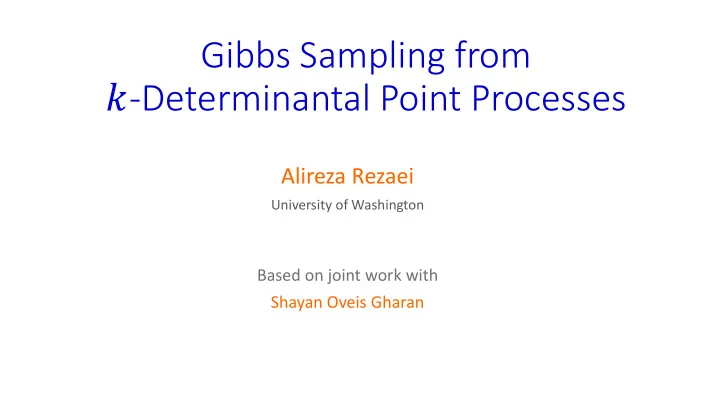

Gibbs Sampling from 𝑙 -Determinantal Point Processes Alireza Rezaei University of Washington Based on joint work with Shayan Oveis Gharan
Point Process: A distribution on subsets of 𝑂 = {1,2, … , 𝑂} . Determinantal Point Process: There is a PSD kernel 𝑀 ∈ ℝ 𝑂×𝑂 such that ∀𝑇 ⊆ 𝑂 : ℙ 𝑇 ∝ det 𝑀 𝑇 𝑴 𝑻
Point Process: A distribution on subsets of 𝑂 = {1,2, … , 𝑂} . Determinantal Point Process: There is a PSD kernel 𝑀 ∈ ℝ 𝑂×𝑂 such that ∀𝑇 ⊆ 𝑂 : ℙ 𝑇 ∝ det 𝑀 𝑇 𝒍 -DPP: Conditioning of a DPP on picking subsets of size 𝑙 𝑴 𝑻 if 𝑇 = 𝑙: ℙ 𝑇 ∝ det 𝑀 𝑇 Focus of the talk: Sampling from 𝑙 - otherwise : ℙ 𝑇 = 0 DPPs
Point Process: A distribution on subsets of 𝑂 = {1,2, … , 𝑂} . Determinantal Point Process: There is a PSD kernel 𝑀 ∈ ℝ 𝑂×𝑂 such that ∀𝑇 ⊆ 𝑂 : ℙ 𝑇 ∝ det 𝑀 𝑇 𝒍 -DPP: Conditioning of a DPP on picking subsets of size 𝑙 𝑴 𝑻 if 𝑇 = 𝑙: ℙ 𝑇 ∝ det 𝑀 𝑇 Focus of the talk: Sampling from 𝑙 - otherwise : ℙ 𝑇 = 0 DPPs DPPs are Very popular probabilistic models in machine learning to capture diversity. Applications [Kulesza- Taskar’11, Dang’05, Nenkova-Vanderwende- McKeown’06, Mirzasoleiman-Jegelka- Krause’17 ] — Image search, document and video summarization, tweet timeline generation, pose estimation, feature selection
Continuous Domain Input: PSD operator 𝑀: 𝒟 × 𝒟 → ℝ and 𝑙 select a subset 𝑇 ⊂ 𝒟 with 𝑙 points from a distribution with PDF function 𝑞(𝑇) ∝ det 𝑀(𝑦, 𝑧) 𝑦,𝑧∈𝑇
Continuous Domain Input: PSD operator 𝑀: 𝒟 × 𝒟 → ℝ and 𝑙 select a subset 𝑇 ⊂ 𝒟 with 𝑙 points from a distribution with PDF function 𝑦−𝑧 Σ −1 𝑦−𝑧 Ex. Gaussian : 𝑀 𝑦, 𝑧 = exp − 𝑞(𝑇) ∝ det 𝑀(𝑦, 𝑧) 𝑦,𝑧∈𝑇 2 Applications. — Hyper-parameter tuning [Dodge-Jamieson- Smith’17] — Learning mixture of Gaussians [Affandi-Fox- Taskar’13]
Random Scan Gibbs Sampler for 𝐿 -DPP 1 1. Stay at the current state 𝑇 = {𝑦 1 , … 𝑦 𝑙 } with prob 2 . y 2. Choose 𝑦 𝑗 ∈ 𝑇 u.a.r 𝑦 𝑗 3. Choose 𝑧 ∉ 𝑇 from the conditional dist 𝜌 . 𝑇 − 𝑦 𝑗 is chosen) [𝑂] Continuous: PDF 𝑧 ∝ 𝜌 𝑦 1 , … 𝑦 𝑗−1 , 𝑧, 𝑦 𝑗+1 , … , 𝑦 𝑙 ) S ∈ 𝑙
Main Result Given a 𝑙 -DPP 𝜌 , an “approximate” sample from 𝜌 can be generated by running the 𝒒 𝝂 𝑷 𝒍 𝟓 ⋅ 𝐦𝐩𝐡 (𝐰𝐛𝐬 𝝆 Gibbs sampler for 𝝊 = ෩ 𝒒 𝝆 ) steps where 𝜈 is the starting dist.
Main Result Given a 𝑙 -DPP 𝜌 , an “approximate” sample from 𝜌 can be generated by running the 𝒒 𝝂 𝑷 𝒍 𝟓 ⋅ 𝐦𝐩𝐡 (𝐰𝐛𝐬 𝝆 Gibbs sampler for 𝝊 = ෩ 𝒒 𝝆 ) steps where 𝜈 is the starting dist. Discrete: A simple greedy initialization gives 𝜐 = 𝑃 𝑙 5 log 𝑙 . Total running time is 𝑃 𝑂 . poly 𝑙 . Does not improve upon the previous MCMC methods . [Anari-Oveis Gharan- R’16 ] Mixing time is independent of 𝑂, so the running time in distributed settings is sublinear.
Main Result Given a 𝑙 -DPP 𝜌 , an “approximate” sample from 𝜌 can be generated by running the 𝒒 𝝂 𝑷 𝒍 𝟓 ⋅ 𝐦𝐩𝐡 (𝐰𝐛𝐬 𝝆 Gibbs sampler for 𝝊 = ෩ 𝒒 𝝆 ) steps where 𝜈 is the starting dist. Discrete: A simple greedy initialization gives 𝜐 = 𝑃 𝑙 5 log 𝑙 . Total running time is 𝑃 𝑂 . poly 𝑙 . Does not improve upon the previous MCMC methods . [Anari-Oveis Gharan- R’16 ] Mixing time is independent of 𝑂, so the running time in distributed settings is sublinear. Being able to run the chain. Continuous: Given access to conditional oracles, 𝜈 can be found so 𝜐 = 𝑃(𝑙 5 log 𝑙) . First algorithm with a theoretical guarantee for sampling from continuous 𝑙 -DPP.
Main Result Given a 𝑙 -DPP 𝜌 , an “approximate” sample from 𝜌 can be generated by running the 𝒒 𝝂 𝑷 𝒍 𝟓 ⋅ 𝐦𝐩𝐡 (𝐰𝐛𝐬 𝝆 Gibbs sampler for 𝝊 = ෩ 𝒒 𝝆 ) steps where 𝜈 is the starting dist. Discrete: A simple greedy initialization gives 𝜐 = 𝑃 𝑙 5 log 𝑙 . Total running time is 𝑃 𝑂 . poly 𝑙 . Does not improve upon the previous MCMC methods . [Anari-Oveis Gharan- R’16 ] Mixing time is independent of 𝑂, so the running time in distributed settings is sublinear. Being able to run the chain. Continuous: Given access to conditional oracles, 𝜈 can be found so 𝜐 = 𝑃(𝑙 5 log 𝑙) . First algorithm with a theoretical guarantee for sampling from continuous 𝑙 -DPP. 𝑦−𝑧 2 Using a rejection sampler as the conditional oracles for Gaussian kernels 𝑀 𝑦, 𝑧 = exp(− ) 𝜏 2 defined a unit sphere in ℝ 𝑒 , the total running time is • If 𝑙 = poly(d): poly(𝑒, 𝜏) If 𝑙 ≤ 𝑓 𝑒1−𝜀 and 𝜏 = 𝑃 1 : poly 𝑒 ⋅ 𝑙 𝑃( 1 𝜀 ) •
Recommend
More recommend